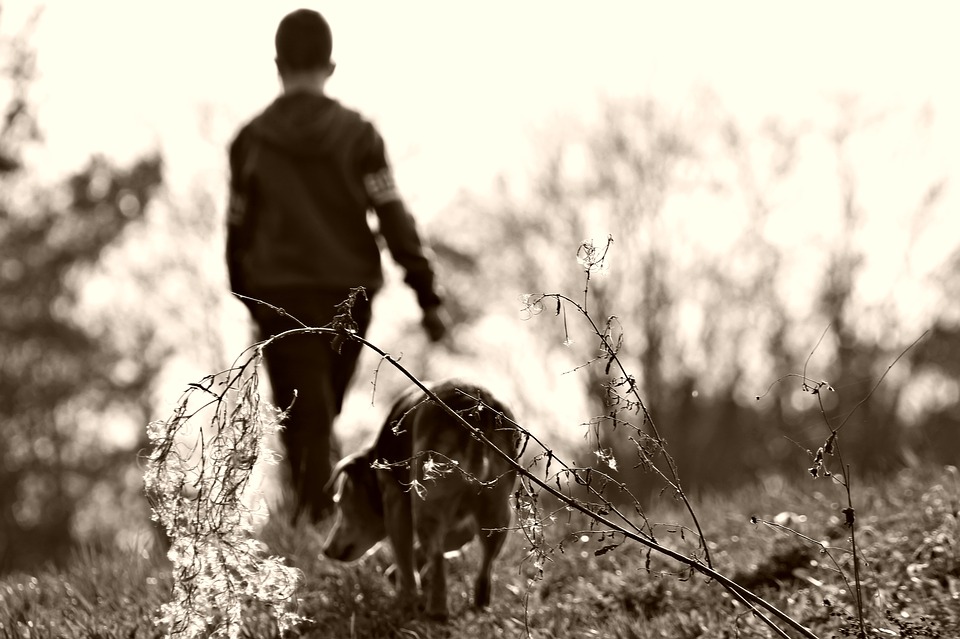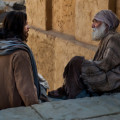For more than a decade, I always told my kids that I have children, not dogs. Some people can take care of both, but I wasn’t one of those people. A few months ago, however, our situation changed. All of a sudden I realized that I didn’t have little kids. And then we bought a house. And my oldest was turning 16, and I wanted to get him a special gift. So we broke down and got him an 11-month-old hound dog. She was house trained but not socialized.
I had no idea what I was getting our family into when we brought her home. I naively thought that as long as we walked her regularly and kept her busy, that she would be fine. And for the first few days that was the case. But then she got more comfortable at our house and started pushing more and more boundaries, and we quickly realized that we needed professional help in training her or one of us was going to have to go. So we enlisted the help of a good friend who is a dog trainer.
As we started our lessons in how to train our dog, our trainer talked to us about the difference between positive and negative “disciplining” of the dog. She told us that dogs learn faster when we focus more on praising the good behaviors than when we try to correct the bad ones. She said that the goal is to get the dog to want to be obedient. It’s all about the motivation— and the consistency. And as the bond grows between us and the dog, the motivations change, too.
But I’m not sure which one of us is harder to train—me, the kids or the dog. As we’ve gone through this process, I have gained insight into the importance and interdependence of commitment, love, trust, choice and commitment in our lives (yes, I said commitment twice… you’ll find out why as you read on). Especially as a follower of Jesus Christ in the world today and a member of The Church of Jesus Christ of Latter-day Saints. So here’s how one little hound dog is helping me become a more committed disciple.
Making the Commitment
Our family started talking about getting a dog about the time we decided it was time to buy a house. First we said, “Now we can because we won’t be renting.” Then we said, “It sounds like fun.” And then we talked about the commitment required. And finally I asked my friend how I would know when we were ready to adopt a dog. She said, “When you’re ready to commit to a dog.”
So we talked about whether we were ready to commit, and everyone agreed (except my husband, who wasn’t sure he was ready). But we went ahead and picked up this dog. As I look back on it, I realize that this was just the first phase of commitment. It’s the part where we say that we will commit. Which is an important step. For members of The Church of Jesus Christ, this step begins at baptism, where we take upon ourselves the name of Jesus Christ. Elder Robert D. Hales said,
At baptism we make a covenant with our Heavenly Father that we are willing to come into His kingdom and keep His commandments from that time forward, even though we still live in the world. We are reminded from the Book of Mormon that our baptism is a covenant to “stand as witnesses of God [and His kingdom] at all times and in all things, and in all places that ye may be in, even until death, that ye may be redeemed of God, and be numbered with those of the first resurrection, that ye may have eternal life” (Mosiah 18:9; emphasis added).
When we understand our baptismal covenant and the gift of the Holy Ghost, it will change our lives and will establish our total allegiance to the kingdom of God. When temptations come our way, if we will listen, the Holy Ghost will remind us that we have promised to remember our Savior and obey the commandments of God.
But making the commitment was just the first step.
The Importance of Love
Once we’ve made the commitment, then we have to learn how to keep it. This is where the importance of love comes in. Love is manifest in many ways—time, patience, kindness, compassion, teaching. And in our dog’s case, training. Love is an essential component in teaching and training. Each of us has a love language. And when we learn the love language of another, we can better serve and teach that person.
It’s the same with a dog. For our dog, nothing says love like food. She likes to be petted, she likes to play, she loves to hunt, but she’ll do just about anything to get a bite of a hot dog. What she doesn’t get is that training her is not just a labor of love on our part but also a show of love. She needs to know and obey the house rules to be safe and happy.
It’s the same way with our Heavenly Father and His laws and commandments. Elder M. Russell Ballard said,
God expresses his love for us by providing the guidance we need to progress and reach our potential.
Elder Dallin H. Oaks taught,
God’s love is so perfect that He lovingly requires us to obey His commandments because He knows that only through obedience to His laws can we become perfect, as He is.
Once we understand this, then our desire to show our love for our Father in Heaven increases. President Dieter F. Uchtdorf said,
Our Father in Heaven has given us, His children, much more than any mortal mind can comprehend. Under His direction the Great Jehovah created this wondrous world we live in. God the Father watches over us, fills our hearts with breathtaking joy, brightens our darkest hours with blessed peace, distills upon our minds precious truths, shepherds us through times of distress, rejoices when we rejoice, and answers our righteous petitions. …
We increase our love for our Heavenly Father and demonstrate that love by aligning our thoughts and actions with God’s word. His pure love directs and encourages us to become more pure and holy. It inspires us to walk in righteousness—not out of fear or obligation but out of an earnest desire.
And this earnest desire helps us to increase our love and appreciation for our Heavenly Father.
Love Builds Trust
This love also builds trust between the two parties. And trust is important in a relationship. One of the first things that I asked the trainer is if she could just train our dog for us. She laughed and said, “Yes, I can. But then she and I will be bonded together instead of you and your family.”
Now, love doesn’t mean that she can do whatever she wants. Nor does it mean that there are no consequences for her behavior. Love builds a trust that she knows we don’t want to hurt her, but we want what’s best for her. In dog language, it means that we teach her that we are her “pack,” or, in human terms, we are her family. We are her safe place. She trusts us to give her what she needs. And eventually, hopefully we’ll be able to trust her more, too.
The same is true with following the commandments of God. It builds a trust in Him and in His plan for us as well as helps us understand the true relationship because love and commandments. As Elder Oaks said,
The love of God does not supersede His laws and His commandments, and the effect of God’s laws and commandments does not diminish the purpose and effect of His love. The same should be true of parental love and rules.
When we follow the commandments of God, it shows Him that He can trust us to do what is right.
Establishing Boundaries
The love and trust forged in training help to create a foundation upon which we established boundaries for our dog—both inside and outside the house. This is important in so many ways. I’ll give you one example. We live on an acre of land but there is no fence. So we got a dog collar that creates an electronic perimeter. As long as the dog stays within the perimeter, she’s fine. When she gets close, it beeps at her. And if she crosses the line, she gets a little electronic zing. With these collars, you have to train the dog correctly or the collar is useless. Some dogs will realize that they can cross the electronic barrier if they can power through that one shock. So they do.
It takes time and patience to train the dog on the collar. You have to go step by step and first teach her what the boundaries are. You have to know what they are first, so you take the collar out without the dog and when it beeps, you put a flag in the ground. Then you take the dog to the markers and let the collar beep. When it beeps, you pull the dog inside the safety zone so she knows what to do.
Then you teach her what happens if she doesn’t heed the beep. For all of these steps, the dog is on a leash. Then comes the test. You take the leash off. For the first few days, someone had to be out there with her just in case. But I knew the true test was if she could stay within the boundaries with my kids on the other side. They couldn’t be calling her or tempting her, they just had to be on the other side of the boundary. I think our dog got zinged a couple of times, but it didn’t take long before she was trained on the collar.
With this collar came new freedom for her. Before, any time she was outside she either had to be on a leash or on the cable. The cable allowed her to be outside alone, but it was only 20 feet long and she got tangled all the time, which was frustrating for us and the dog. But the collar was a whole new kind of freedom. As long as she stays within the electronic perimeter, she can be outside for as long as she wants. She can explore and chase the squirrels and sniff to her heart’s content. Her freedom comes with boundaries.
It is the same with us. True freedom comes with boundaries. And these boundaries are established by our Heavenly Father. President Boyd K. Packer said,
… We develop control by teaching freedom. It may seem unusual at first to foster self-control by centering on freedom of choice, but it is a very sound doctrinal approach.
While either subject may be taught separately, and though they may appear at first to be opposites, they are in fact parts of the same subject.
Some who do not understand the doctrinal part do not readily see the relationship between obedience and agency. And they miss one vital connection and see obedience only as restraint. They then resist the very thing that will give them true freedom. There is no true freedom without responsibility, and there is no enduring freedom without a knowledge of the truth.
We had to teach our dog the boundaries before she could stay within them. It is the same with us. We can’t obey the commandments of God if we don’t know what they are.
The Power of Choice
True freedom comes in knowing the commandments and choosing to obey them. But we still have the power to choose. We are now at the point with our dog that we can trust her outside, but not inside. At least when she’s by herself. Having her is like having a cross between a toddler and a teenager. She’s stubborn and always trying to get whatever it is she thinks she needs at that moment. Which is a blessing and a curse.
If we’re training her and she wants the piece of hot dog in your hand, she’ll figure out exactly what she needs to do to get it. If you’re eating the hot dog and she wants it… well, we’re still working on that. Sometimes she does better than other times. She has the power to choose her behavior, but she doesn’t get to choose the consequences. If she’s being obnoxious while we’re eating and we can’t get her to lie on her bed, then sometimes we put her in her crate and other times we put her outside. The last time we left her home alone and uncrated, she ate three flip flops and a TV remote. Now, whenever she’s home alone, she is contained in her crate. She has the power to choose, and we have the power to choose her consequences.
Interestingly, it is the same with us. We have the power to choose, and Heavenly Father has the power to choose our consequences—good or bad. Elder L. Tom Perry said,
A useful way to think about the commandments is they are loving counsel from a wise, all-knowing Heavenly Father. His goal is our eternal happiness, and His commandments are the road map He has given us to return to Him, which is the only way we will be eternally happy.
When we choose to obey God’s commandments, we choose happiness. If we are disobedient, then we aren’t. Elder Perry continued,
God reveals to His prophets that there are moral absolutes. Sin will always be sin. Disobedience to the Lord’s commandments will always deprive us of His blessings. The world changes constantly and dramatically, but God, His commandments, and promised blessings do not change. They are immutable and unchanging. Men and women receive their agency as a gift from God, but their liberty and, in turn, their eternal happiness come from obedience to His laws. As Alma counseled his errant son Corianton, “Wickedness never was happiness” (Alma 41:10).
True Commitment
Commitment has taken on a whole new meaning not only for me but also for our family in this process. The kids and I made the commitment and were determined to prove to my husband that we were ready. But with each setback in the dog’s progress—and in the willingness (or lack thereof) of my kids to help—we have to again decide if we are willing to keep the commitment that we made to this dog.
It is the same with obeying the commandments of God. We make a choice at the beginning to follow His commandments, which makes it easier and easier to continue. But we still have to make the choice each time to either do what is right or not. Elder Richard G. Scott said,
Continually bless your life with the power of righteousness. It builds confidence. It engenders trust. It yields enduring, worthy achievement. To be righteous is to seek intently to be obedient to the commandments of God. It is to be clean in thought and act. It is to be honest and just. Righteousness is shown more in acts than in words. A righteous life requires discipline. Discipline is that characteristic which will give you the strength to avoid giving up what you want most in life for something you think you want now. It is a friend, not a harsh taskmaster that makes life miserable. Discipline is easier to acquire when it is rooted in faith in Jesus Christ, when it is nourished by an understanding of His teachings and plan of happiness.
And as we continue following the commandments of God, we continue to find the peace and happiness that we seek.
I have found a similar outcome with our dog. The other day the dog ate my oldest son’s shoe. She’s really his dog and it was his shoe, but I was still not happy about her chewing up a perfectly good slide. So when he came home I told him about it. I was really surprised at his answer, “That’s OK, Mom. I realize that this is part of the price I pay for having a dog. And I’m willing to pay it.” He said that in the beginning, he would probably have been really upset. But now, he really loves her and doesn’t want to give her up. The other kids feel the same way.
Which made me realize why I made this commitment in the first place—for my kids (and my husband). I knew that they would love the dog. I knew that she would add the special love and happiness that comes from having a 4-legged friend in the family. And I’m grateful for the insights that she has given me.






